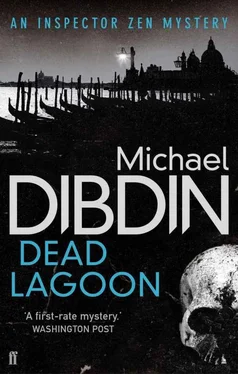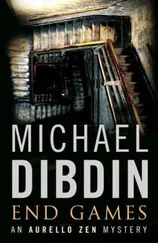Michael Dibdin - Dead Lagoon
Здесь есть возможность читать онлайн «Michael Dibdin - Dead Lagoon» весь текст электронной книги совершенно бесплатно (целиком полную версию без сокращений). В некоторых случаях можно слушать аудио, скачать через торрент в формате fb2 и присутствует краткое содержание. Жанр: Полицейский детектив, на английском языке. Описание произведения, (предисловие) а так же отзывы посетителей доступны на портале библиотеки ЛибКат.
- Название:Dead Lagoon
- Автор:
- Жанр:
- Год:неизвестен
- ISBN:нет данных
- Рейтинг книги:5 / 5. Голосов: 1
-
Избранное:Добавить в избранное
- Отзывы:
-
Ваша оценка:
- 100
- 1
- 2
- 3
- 4
- 5
Dead Lagoon: краткое содержание, описание и аннотация
Предлагаем к чтению аннотацию, описание, краткое содержание или предисловие (зависит от того, что написал сам автор книги «Dead Lagoon»). Если вы не нашли необходимую информацию о книге — напишите в комментариях, мы постараемся отыскать её.
Dead Lagoon — читать онлайн бесплатно полную книгу (весь текст) целиком
Ниже представлен текст книги, разбитый по страницам. Система сохранения места последней прочитанной страницы, позволяет с удобством читать онлайн бесплатно книгу «Dead Lagoon», без необходимости каждый раз заново искать на чём Вы остановились. Поставьте закладку, и сможете в любой момент перейти на страницу, на которой закончили чтение.
Интервал:
Закладка:
Michael Dibdin
Dead Lagoon
A ragged line of geese passed overhead, silhouetted against the caul of high cirrus, heading out towards the open sea. Over towards Marghera, a bloated sun subsided into a dense bank of smog, dwarfing the striped stacks of the refineries. Giacomo noted the rippled layers of cloud spreading across the sky like wash from a motorboat. The weather was changing. Tomorrow would be squally and cold, a bitter north-easterly bora raising choppy seas on the lagoon.
But tomorrow was another day. For now the air was still, the water smooth as oil, the creak of the oars against the thole and the gentle plashing of the blades the only sound. People thought Giacomo a bit odd, sculling out to tend his nets in this day and age. No one rowed any more except the yuppy oarsmen from the city’s boating clubs. But Giacomo had no interest in reviving the picturesque traditions of the past. If he preferred oars to outboards, he had his reasons. On an evening such as this, the noise of a motor carried for miles across the water, and Giacomo did not want any inquisitive ears tracking his progress through the shoals and along the winding creeks to his destination.
His eyes alertly scanned the water ahead. The channel he was following was unmarked and the tide was ebbing fast. It would have been better to come at another time, but Giacomo simply carried out the orders he received by telephone. Tomorrow, the voice had said, so tomorrow it must be. He would be well enough paid for his pains. Meanwhile, he needed all his skill. The flat-bottomed skiff drew only a few centimetres, but it was always easy to run aground in these treacherous backwaters.
He raised his head, locating the long low ridge, exuberantly green, towards which he was making such slow progress along the tortuous windings of the tideway. To the east, the desolate swamps and salt-flats of the laguna morta — the dead marshlands, unrefreshed by tidal currents — merged seamlessly into the gathering dusk. The schoolteacher on Burano said that there had once been a splendid city here, with fine palaces and churches and paved streets, all swallowed up hundreds of years ago by the shifting topography of the lagoon.
Standing in the stern of the boat, Giacomo paused to light a cigarette. The teacher was a good soul, and would pay well over the odds for crabs and mussels, but she’d had the misfortune to be born on the mainland, and it was well known that mainlanders would believe anything. Giacomo breathed out a lungful of smoke, which drifted indolently away across the water towards the drooping heads of the wild grasses on a nearby mudbank. The dull roar of a plane taking off from the international airport at Tessera reminded him of his business. Dipping the crossed oars into the water once more, he leant forward with his whole body, urging the sandolo across the shallow water.
The light was fading fast by the time Giacomo beached the skiff on the flats exposed by the ebbing tide. He stepped out, his waders sinking into the mud, and hauled the craft clear of the water. Before him rose a mass of creepers and brambles, overgrown bushes and stunted trees, spilling down over the low wall sealing off the island. At the centre, a set of steps led to a bricked-up gateway. Slinging a blue canvas bag over his shoulder, Giacomo squelched off across the quagmire towards a stretch of wall completely submerged beneath the burgeoning greenery.
Beneath the overhanging shrubbery it was already night. Giacomo took a rubber-covered torch from his pocket and shone it round. A rat jumped from a hollow in the wall into the shallow water at its base. The hollow had been formed by the removal of two of the flat ochre bricks of the three-hundred-year-old wall. Giacomo remembered the effort it had taken, hammering away with a mallet and a cold chisel for the best part of twenty minutes. They built to last in those days, even for such clients as these. Other bricks had been gouged out above, and using these holds Giacomo scaled the wall and perched on the top. All was still. Even in broad daylight, people gave this particular island a wide berth. Nothing would persuade anyone in their right mind to venture there once darkness had fallen.
The surface inside was much higher, almost level with the top of the wall. Giacomo stepped down and started to push his way through the undergrowth, following a series of almost imperceptible markers: the torn ligaments of a branch dangling from a bush, a patch of flattened grass, the sucker of a bramble bush, thick as a squid’s tentacle, lopped off clean by a fisherman’s gutting-knife. The ground crunched and slithered underfoot, as though he were walking on layers of broken crockery.
A sudden scuttling noise brought him to a halt, wielding his torchbeam like a staff. The island was infested with snakes, and Giacomo tried with limited success to convince himself that this was the only feature of the place which scared him. He lit another cigarette to calm his nerves and pushed on through the spiny undergrowth, across the grating, shifting surface, until he made out the final mark: a desiccated bough leaning across a briar patch as though it had fallen from the dead tree above. One contorted branch pointed towards him, marking the path back. Another, bifurcated like a petrified hand, stuck out at an angle to one side. Following it, Giacomo quickly located the mound of shards, white in the torchlight. At the same moment, he heard the scuttling sound again.
It was only when he unslung the bag from his shoulder that he realised he had forgotten to pack the small spade he usually brought. Well, he wasn’t going back, that was for damn sure. Nor had he any intention of touching the things with his hands. Tossing away his cigarette, he snapped a length off the dead bough and started to prod and jab at the mound, freeing a long femur here, the smooth gleam of a scapula there, a rounded skull, a big hip and pelvis. At last the dull gleam of the oilcloth wrapping appeared.
The stick broke as he redoubled his efforts. He hastily tore another from the branch behind him, and when that broke too used his boot to free the package. Breathing hard, he unwound the oilcloth, revealing three blocks wrapped in silver foil and plastic shrink-wrapping. They were about the size and shape of a cork float, but much heavier — precisely one kilogram each, in fact. Giacomo carefully lifted them in turn and transferred them to the canvas bag. Then he added the oilcloth wrapping and fastened the bag before turning for home.
The torch beam wavered and probed the darkness all around, seeking the gnarled bough which pointed the route home. It was nowhere to be seen.
Giacomo searched the shrubbery in increasing desperation until he found the broken branch entangled in the thorns. It must have keeled over when he snapped part of it off to use as a spade. For a moment he almost gave way to panic. Then, with an effort, he got a grip on himself and started to study the undergrowth all around. It must be that way, surely, to the right of that squat, lopsided shrub. Yes, that was it. He recognized it.
A few metres further on, the path, if that’s what it had been, petered out in a mass of briars twice as high as a man. He must have been mistaken. He started back, but he was unable to find the clearing where the cache had been located. Then he saw what looked like one of the markers guiding him back to the boat and threw himself at it, plunging through the shrubbery like a speedboat through breaking waves, ripping and tearing the undergrowth apart until its spiky tendrils fouled his limbs and brought him up short in an impenetrable mass of brambles.
Instinctively he glanced up at the sky, but the nebulous wash of cloud drifting in from the east had swallowed the stars. The evil jungle, its roots fattened on hundreds of thousands of human skeletons, pressed in on every side, shutting out the world.
Читать дальшеИнтервал:
Закладка:
Похожие книги на «Dead Lagoon»
Представляем Вашему вниманию похожие книги на «Dead Lagoon» списком для выбора. Мы отобрали схожую по названию и смыслу литературу в надежде предоставить читателям больше вариантов отыскать новые, интересные, ещё непрочитанные произведения.
Обсуждение, отзывы о книге «Dead Lagoon» и просто собственные мнения читателей. Оставьте ваши комментарии, напишите, что Вы думаете о произведении, его смысле или главных героях. Укажите что конкретно понравилось, а что нет, и почему Вы так считаете.











